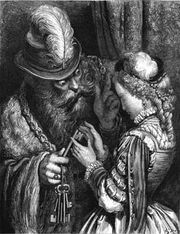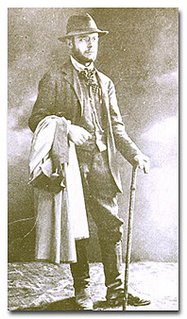Friday, December 15, 2006
Have you heard Joanna Newsom's new album?
In any case, I felt I had to check out her new album after reading a considerable number of intriguing and positive reviews, notably Sasha Frere-Jones' from The New Yorker and the one from the sometimes-irritating Pitchforkmedia.com site. There are only five tracks on the new album, all lengthy affairs full of the constant motion of her harping and her singing, and four tracks also have highly imaginative and unpredictable orchestral scoring by Van Dyke Parks. Her songs seem to consist of long sequences of her simple harmonic progressions, one after another, after another, endlessly strung with her voluminous and poetic lyrics. I say poetic, and I think I mean it. Each song reads like a long, imaginative work of poetry; whether it’s good poetry or bad poetry, I’m not really sure, but it seems to hold my attention, obliquely touching on themes of family and work, and art and music, myth and history, and who knows what else, replete with details from the natural world, minnows and bears and meteors…I like it.
And the orchestration is great, shimmering with ideas, buffeting the melodies and lyrics like the various waters and worlds surrounding a small boat passing downstream on its way to the ocean. (That analogy was a bit much, wasn't it?) Mr. Parks has worked on many other notable projects, including the finally-last-year-released SMILE album from Brian Wilson, a couple tracks with Sam Phillips (one of my favorite singer-songwriters of the 90’s), and some work of his own. I have an album of his called Song Cycle. I hated it when I first played it, and shelved it for three years, only pulling it out a couple weeks ago after hearing Ms. Newson’s new album. Now, well, I like it, but haven’t really fallen for its willful eccentricities yet.
Anyway, regarding Ys: it seems to have caught me. I’ve played it through a few times in just a couple of weeks, a rare event these days for me, especially for anything related to the popular music world. Maybe this is music far removed from that world, but I don’t think so. It’s less complicated music than the recent press would have you believe, less complex than you might think at first from its unique instrumentation and long, poetic structures. It is accessible and straightforward music, done with personality and imagination, and worth checking out.
My apologies if her voice makes your cat cry.
Thursday, November 23, 2006
Bluebeard's Castle

I promised you Bluebeard’s Castle, didn’t I? I didn’t really intend to write about it, but I listened to this one-act opera of Bartok’s last night for the first time in many years and felt like saying something about it.
It’s an early piece of Bartok’s, written around 1910 or so, and is loosely based on an old fairy tale by Charles Perrault, Bluebeard, which concerns a murderous villain and his new young wife. He brings her home soon after they are married and forbids her to open a particular door in his castle, but of course gives her the key anyway, so…she opens it! And finds the dead bodies of his previous wives hanging on the walls. He finds out what she's done and chases her, intending to kill her, but she is rescued in the end by her brothers. A happy ending, I suppose, to a gruesome story.
Bartok’s story is similar – Bluebeard brings his wife home, where she sees there are seven locked doors. She is curious, but Bluebeard tells her they must not be opened, and makes a foreboding reference to ‘rumours’ about him. But she can’t let it go, and persuades Bluebeard to give her the keys to each room, and she opens them one by one. In the first we have a torture chamber, in the second an armory, the third, gold and jewels, the fourth, a beautiful garden, the fifth, grand vistas of Bluebeard’s lands, the sixth, a glittering fountain, and in the seventh…Bluebeard’s three former wives, but not really dead. They are living, and move about, but they don’t seem all that talkative (there are only two singing parts to the opera, Bluebeard and his wife, Judith).
What I find interesting is Bartok’s use of this story as an analogy, more or less, for a classic battle of the sexes. Though on the surface, (and clearly in the original folk tale), Judith is the heroine, Bartok’s point of view seems particularly sympathetic to Bluebeard. (Disclaimer: this is not just my own psychoanalysis; some of these thoughts were sparked by the liner notes, particularly the conductor Istvan Kertesz’s comments.) In fact, one can almost look at the story from a comical standpoint, as if it’s a modern sitcom. The guy, who just wants to love his wife and have her love him, but doesn’t really want to share too much or expose himself. He knows there are things buried in him (and in all men) which are not attractive. But his wife can’t leave him alone, she keeps pestering him to open up, which he reluctantly does, and eventually she drags out of him more than she can bear to know, and of course things end badly after that.
Now, I don’t want to analyze this too far; on the surface of things Bluebeard is a villain, and one certainly wouldn’t want to defend his crimes too much. But everything that is depicted falls very easily into metaphors for the life of a man and his relationship with the women he’s been close to, and Mr. Kertesz makes a very compelling, concise point: he says about Judith “She doesn’t want him, she just wants to open his doors.”
This brings up a lot of interest thoughts regarding relationships. All of us, I think, and maybe especially men?, have things in us which we don’t want to share, can’t share, ugly things, embarrassing things. In an ideal relationship we share as much as we can of ourselves, and are allowed to be ourselves as much as possible instead of playacting some other person, but still…there are some things better hidden, and finding that compromise with people you truly care about can be challenging. I don’t mean that we’re hiding violent crimes (in most cases) but we all put on at least slightly different faces when we are interacting with people than when we are alone, and often different faces for the different people we see. Or maybe it’s just me? It would be interesting to get a woman’s take on this story.
Regarding the music, it’s wonderful. Not yet in Bartok’s mature idiom, it has echoes of Strauss and Mahler, with a strong stamp of Bartok’s own developing personality, but it is very evocative and imaginative. The structure of the story is perfect for a series of small tone-paintings, as Judith opens each successive door to see something different. The garden brings forth a dense yet vibrant tapestry of verdant growth and birdsong, the grand vistas of Bluebeard’s estates ring with magisterial, swelling brass figures that seem to look across to the horizon, the fountain brings serene, drifting notes. When Judith becomes jealous and begins to ask Bluebeard about his former wives, you can hear a note of madness creep into her voice as she sings a thin monotone backed by dissonant strings edging against her notes.
And best of all, this is a short opera, about one hour long, and I was able to listen to the whole thing without falling asleep or letting my attention drift away!
Wednesday, November 22, 2006
Bartok's Fifth String Quartet

Here's a picture of me getting ready for a tramp in the woods.
No, actually, (as if I really fooled you), this is Bela Bartok getting ready for one of his groudbreaking forays into the Transylvanian countryside to collect folk music. Bartok was one of the first musicians to systematically collect, study and categorize folk music. What he heard and learned during his trips across the countryside of what used to be just Hungary and is now also Roumania and Czechoslovakia had a profound affect on the music he composed and on his thinking as a human being.
But I'm not really intending to write another biography of Bartok, as much as I think he led a fascinating life. I've been listening to a lot of his music lately, and in particular his string quartets, which are often (and justly) referred to as the 'new testament', the old testament being the quartets of Beethoven. I would like to urge anybody and everybody to give these a listen - get them out of the library if you don't already have them - especially the Fifth quartet, which is my personal favorite.
I've been trying to come up with a concise, intelligent way to describe this quartet and why I like it so much, but have been mostly failing to find the right words. It is a gentler and more austere quartet than the fourth, which may be his most well-known, but it is still full of the spiky character and strong dissonances that inhabit most of Bartok's work. Bartok himself could be spiky and dissonant by most accounts, but he was also a fierce idealist and compassionate humanist, a proud Hungarian yet universalist in his outlook, and these qualities also show in every measure of his music, and never more than in this piece. On a more specific note, if you listen to this quartet, note the five-movement structure of the piece, the affinities of the first movement for the last and the second for the fourth (the fourth movement is essentially a free variation of the second). Bartok never subscribed to any established system of composing but came up with plenty of his own.
Next stop, Bluebeard's Castle!